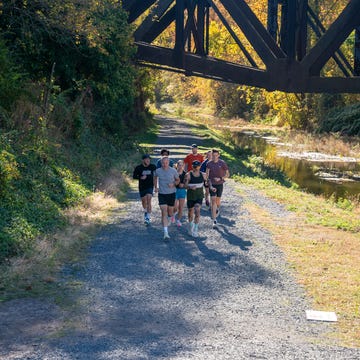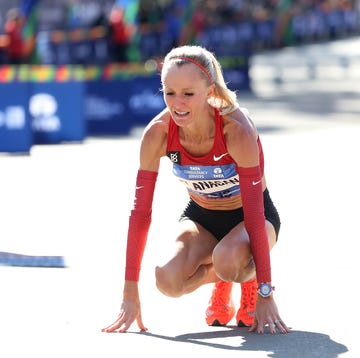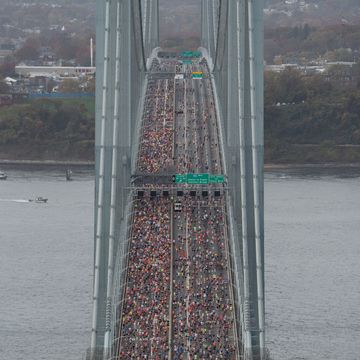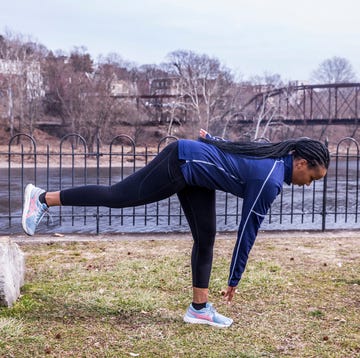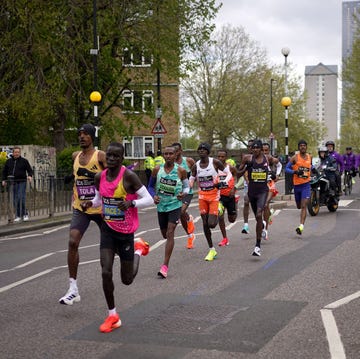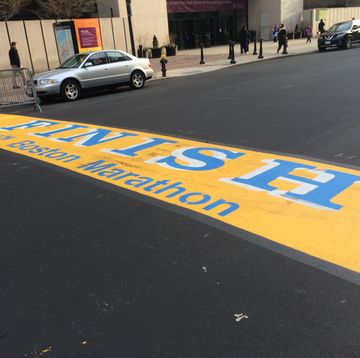Now in his ninth year at the University of New Mexico, Joe Franklin has this fall achieved something never before accomplished by a UNM women’s sports team: a No. 1 national ranking. Franklin has taken his women’s team to nationals eight straight years while the Lobo men have advanced each of the past six years.
Although the New Mexico women reached the podium with a third-place finish at NCAAs last November, losing four members of the 2014 varsity put the current season in doubt. But Franklin brought in a stellar group of newcomers, including Rhona Auckland, 21, from Scotland, who won the European U-23 cross-country title last December and went on to finish 19th in the senior division at the 2015 world cross country championships in March. And then there’s Courtney Frerichs, who graduated from University of Missouri-Kansas City with eligibility remaining in cross-country and outdoor track and is doing a fifth year at New Mexico. The steeplechase specialist was 13th at NCAAs last November.
The UNM women coasted to an easy 29–74 victory over current No. 12 North Carolina State at the Notre Dame Invitational on October 2, while the men ended up ninth and subsequently slipped out of the rankings. Franklin’s men and women will be put to a true test on Friday at the Wisconsin Invitational. The Mountain West Conference Championships follow October 30. Running Times How to Better Pace a Marathon Based on Effort.
Running Times: Your women’s team has been ranked first for nearly a month and has attracted a great deal of attention. Has it been mostly exciting or has being in the spotlight been wearing on all of you?
Joe Franklin: You know, the first couple of days, maybe four weeks ago, it was new territory for a lot of people and a little different. And to say it was easy would not be truthful, because it was a little stressful. But now that’s all worn off—the 15 minutes are gone. So everyone is doing great and everything is normal again, which is nice. And like we’ve been saying here for 10 years, we have to keep it fun and light-hearted and not take ourselves too seriously.
RT: The competitive DI cross country season now essentially consists of the Wisconsin Invitational/Pre-Nationals weekend followed by conference, regionals and nationals. Of course there are still other races, but they’ve lost a lot of significance and a few top teams may not run at full strength until nationals. Do you feel what we have now is the optimal structure for the season? And is your job in some ways made more difficult by boiling the season down to so few competitions?
JF: Well, this issue kind of has some buzz right now. And I personally like the system that we have. In our sport you can’t go to the well every weekend, because if you do it’s probably going to be dry by November and definitely by June. So I like the set-up now, although that doesn’t mean my philosophy wouldn’t change if the way we conducted our season changed.
If you looked at the mid-1980s when we raced more often, it took around 29:30 to make the NCAA outdoor championships in the 10,000m on the men’s side. That kind of time doesn’t even sniff it anymore; you barely make the regional running that. So the level has gone up and up and up. And to ask a student to go to school, which is first and foremost, and continue to just raise the level of competition, you don’t have a lot of opportunities to do that. So when you look at your super-elite kids who have to train and have to be ready to run at a high level in November, that essentially makes the early part of September and almost into late September at some level irrelevant. So does it make our job harder? No, but you just have to make sure you’re dialed in at the right time.
RT: And the overall season is the same length, so I’m guessing you’d say that the good coaches don’t need seven or eight races to get their athletes well prepared.
JF: That’s right, and we all have our checkmarks and the things we do that tell us if our kids are ready to run well. If they’re doing X, Y, and Z it’s going to predict at some level, barring mental breakdown, a certain range of performance.
RT: Running in the Cold?
JF: You know, when I ran cross country in the ’80s for Purdue I wasn’t very good, and I don’t know if that had anything to do with the number of races we ran or if I just wasn’t any good. But from the team dynamic standpoint, it’s all a buy-in from everybody and I don’t see less racing as a concern. And for us being out here in New Mexico, if we had to race every weekend, there just aren’t any schools. We’re in a unique situation because the closest Division I school is UTEP at four hours, and then Northern Arizona is four and a half hours. And then you go to the six hour radius which consists of Texas Tech, Air Force and Arizona State. So within a six-hour radius we don’t have the options that others have, it just doesn’t exist. When I was at Butler I don’t know how many schools we had within a six hours of us, maybe about 50. So it’s geographical discrimination.
RT: Your women’s team was third at nationals last year, a tremendous result, but only three of your top seven returned. Hardly anyone would have predicted that you’d be top ranked here this October and it’s largely because you’ve brought in several strong transfers and Europeans with international credentials. Because these students are older and more experienced, is it will be harder to get the team working together optimally?
JF: Not at all, and I would say it’s the opposite. The students we have all want to be great runners. And they’re coming here for the educational opportunities and the opportunity to run with a great group of men and women. And so the buy-in, so to speak, is very easy. The adaptation and training, we haven’t had any issues with those things at all. We meet with people regularly and there’s constant communication and dialogue. And when we’re recruiting these students we want to make sure they fit with what we’re doing. When they close this chapter of their running careers at the University of New Mexico we want them to have done everything they could to be successful. So we’re careful to fully explain what we’re about and to also find out what they’re about, to ensure it’s a good fit.
RT: It wasn’t widely known that Courtney Frerichs was transferring in to New Mexico until late in the summer. She certainly had a solid performance at Notre Dame, as your top finisher (and runner-up to NC State freshman Ryen Frazier). Her distance coach at UMKC, James Butler, is an Albuquerque native and is now an assistant on your staff. What was the sequence of both of them joining your program?
JF: Well, for a few years I knew that if I had an opening James was one of the first guys I would go after. He got his masters from here and was a graduate assistant for us during those years, so he knew our system and everything about us. His strengths compliment my strengths, so it’s a good team. When Coach Butler came here, Courtney looked at a few schools and then decided that this would be the best place for her. I don’t know the exact timeline of her decision, but it was several weeks after Coach Butler decided to take the job. So Courtney’s coming here wasn’t taken lightly at all, and she has adapted very well.
RT: Ask the Coaches: Foamy Sweat?
JF: For the women it’s really about making sure they’re used to running in a field size of about 260 athletes, which is the thing we like about this race. It’s the only time beside nationals where you have an opportunity like this. We’ll be looking to make sure we can find each other and work together in such a big and talented field. On the men’s side, we’ll be trying to get a little better and pick off some of those at-large points, which we can do. At Notre Dame we had one guy who was a little off and another who tweaked his hamstring warming up for the race. So we're going to be better at Wisconsin, but we need to get that done so that we have the opportunity to be considered for the national championships. The Mountain Region is very deep and there's going to be a lot of teams coming out of here, and we need to be sure to get enough wins so we're one of those.
RT: As far as the women's team, will you be running at full strength this Friday?
JF: Oh yeah. Baring something between now and when we fly up there we'll run our top group. We won't be holding anybody out.


